Ever notice how your heart starts racing when the music suddenly shifts during a video game? It’s pretty incredible how game soundtracks can totally change the way we play. Let me tell you, it’s no accident when that peaceful background tune makes you feel like exploring every corner of a new map, or when intense battle music kicks in and your palms get sweaty.
Game designers and composers are basically musical wizards, working behind the scenes to guide our emotions and actions without us even realizing it. You might think you’re completely in control when you’re playing, but the truth is, those carefully chosen melodies and sound effects are quietly pulling the strings of your gaming experience.
Think about it – remember that last time you were casually strolling through a game world, and suddenly the music turned dark and ominous? Bet you instantly started moving more cautiously, right? That’s exactly what the designers wanted. These audio cues tap into something really deep in our brains, triggering everything from basic survival instincts to complex emotional responses.
The really fascinating part is how these musical elements shape our gaming decisions in ways we don’t even consciously notice. It’s like having an invisible companion that’s subtly nudging us in certain directions, affecting our mood, and even influencing how we tackle challenges in the game.
The Psychology Behind Gaming Music
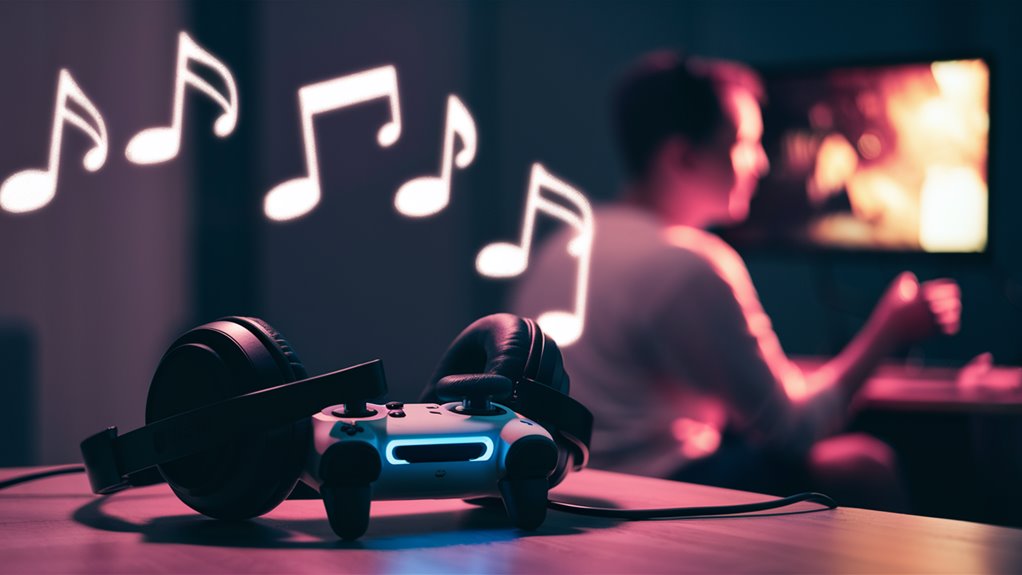
Ever wonder why certain game soundtracks stick with you long after you’ve put down the controller? Well, it’s actually pretty fascinating how our brains form these incredible bonds between music and gaming moments.
Game developers know this all too well, and they’re pretty clever about using music to get us in just the right headspace while we play.
Think about those times you’re just wandering around in an open-world game. You mightn’t even notice it, but those gentle, flowing background tracks are doing some heavy lifting.
They’re helping you stay focused without burning you out mentally. And then, bam! You hit a boss battle, and suddenly those heart-pounding drums and sweeping orchestral pieces kick in.
That’s your body getting ready for 토토사이트 보증 action, with adrenaline starting to pump through your system.
Here’s something cool – have you noticed how the music seems to know exactly what you’re doing in the game? That’s because modern games use these smart music systems that change up the tunes based on your actions.
When you’re in danger, the music ramps up, and when things calm down, so does the soundtrack. It’s pretty amazing how this can actually affect your physical state, from your heartbeat to how tense your muscles are.
And let’s talk about reaction times for a second. The right background music can actually make you respond up to 20% faster in those intense action scenes.
On the flip side, when you’re trying to figure out a tricky puzzle, those calmer melodies help your brain work through the solution.
But you know what’s really interesting? It’s how these game tunes stick with us.
Years later, you might hear that one special theme song, and boom – your brain releases dopamine, and suddenly you’re right back in that gaming moment from way back when.
That’s why we can remember certain game soundtracks so clearly. They’re not just background noise; they become part of our gaming DNA.
Stress Response and Reaction Time
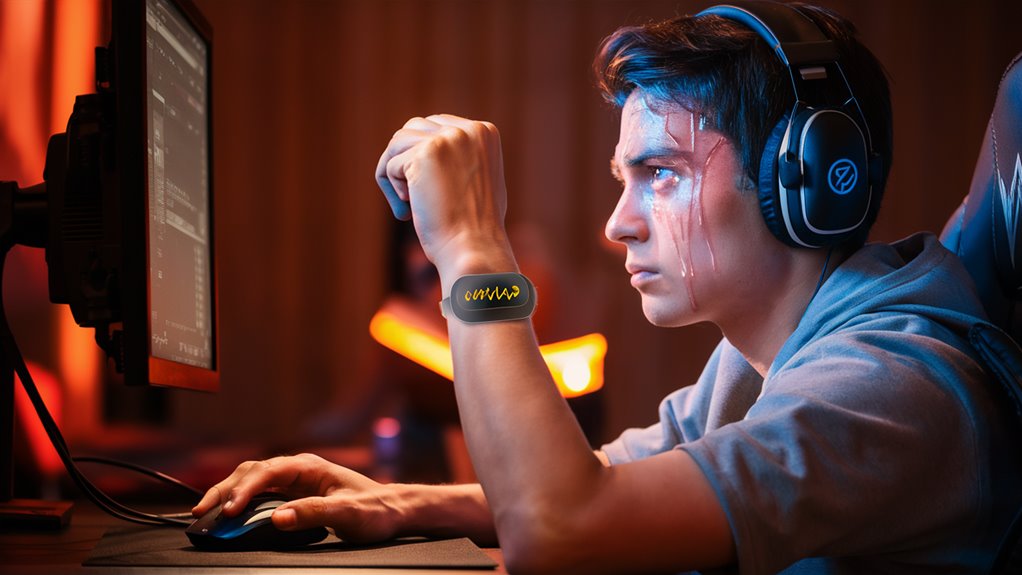
You know how music can totally change the way you play video games? It’s pretty fascinating stuff.
When you’re deep in a gaming session, the soundtrack does way more than just set the mood – it actually affects your body’s response to what’s happening on screen.
Think about those moments when you’re in an intense boss battle. The fast, pumping music kicks in, and suddenly your heart’s racing, your muscles tense up, and you’re more alert than ever.
It’s no accident that action games use those driving beats during combat. Your brain naturally syncs up with the rhythm, helping you react faster when enemies pop up on screen.
But here’s the cool thing: it works the other way too. Ever notice how puzzle games tend to have more relaxing tunes?
There’s a good reason for that. When you’re trying to figure out a tricky solution or plan your next move, calmer music helps keep your stress levels just right.
It’s like giving your brain the perfect environment to make smart decisions. Some research even suggests that when the music matches what you’re doing in the game, your reactions can be up to 20% quicker.
And let’s not forget about horror games. They use those sudden musical stings to make you jump because they know exactly how to trigger that fight-or-flight response.
Meanwhile, stealth games often keep things quiet and minimal, helping you stay focused when you’re trying to sneak past enemies. It’s pretty clever how game designers use music to get exactly the response they want from players.
Memory Formation Through Game Audio
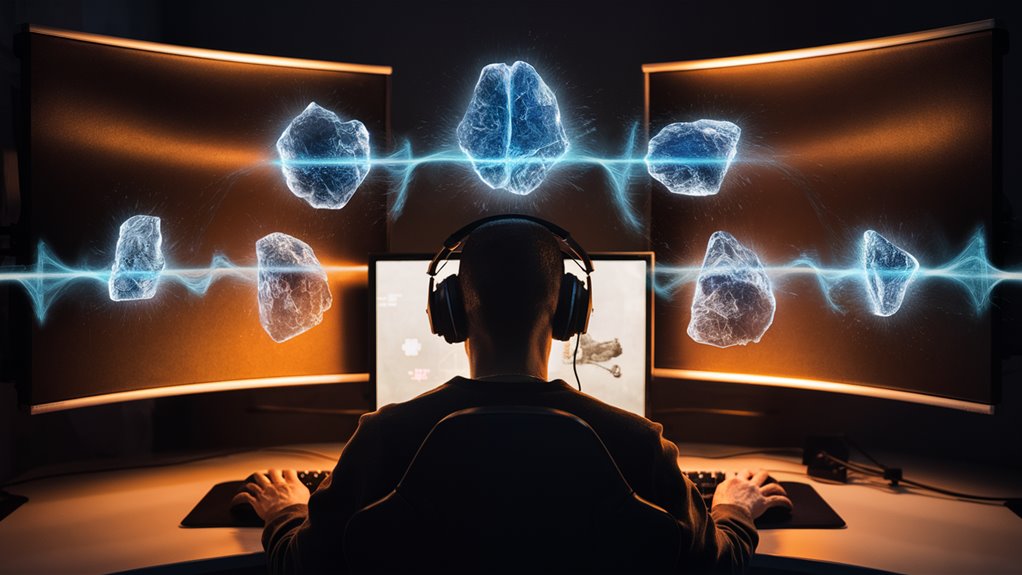
You know how certain sounds can instantly transport you back to your favorite gaming moments? That’s your brain doing some pretty incredible memory work.
Every time you play a game, those distinctive sound effects and music tracks aren’t just background noise – they’re actually creating lasting impressions in your 도박사이트 먹튀 여러가지유형 mind.
Let’s break down how this works. Your brain is constantly making connections while you play, kind of like creating a mental scrapbook.
When you hear that classic coin-collecting chime in Mario or the ominous warning beep in Halo, something fascinating happens. Your amygdala, the emotional center of your brain, processes these sounds while your hippocampus ties them to specific memories of your gameplay experiences.
But here’s the really cool part – these audio memories don’t just stay in your gaming world. Have you ever walked down the street and heard something that sounded just like a video game sound effect?
Maybe a car alarm that reminded you of an enemy approach, or some background music that made you think of your favorite boss battle? That’s because game designers are really clever about creating unique sound signatures that stick with you.
They know these audio cues will become part of your personal gaming soundtrack, triggering quick reactions and emotional responses long after you’ve put down the controller. Pretty neat, right?
Music’s Impact on Player Decisions
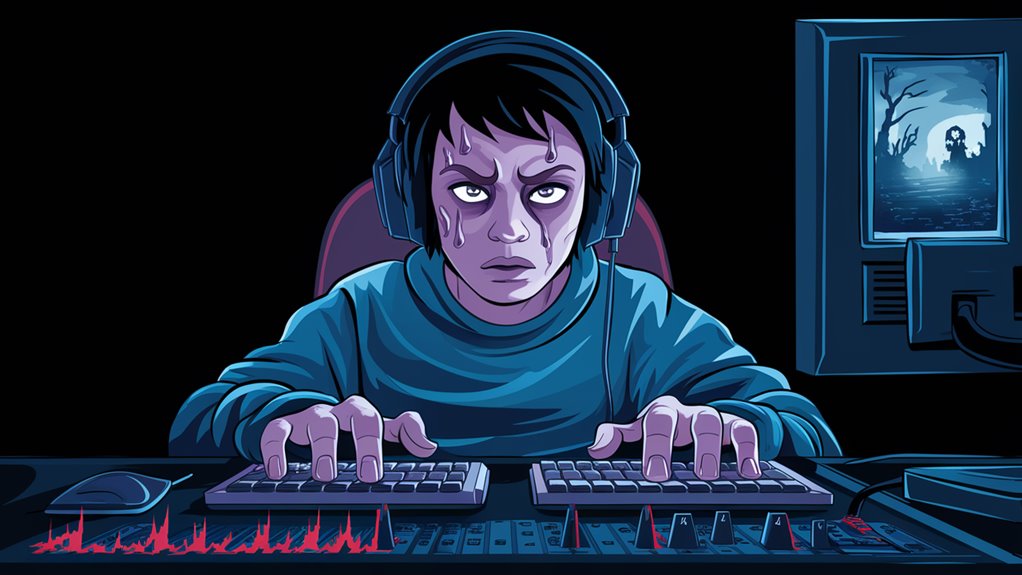
You know how music can totally change your mood? Well, it turns out it does way more than that in video games – it actually influences the way you play and make decisions.
Think about the last time you were gaming and heard that familiar battle music kick in. Before you even saw any enemies, you probably started getting ready for a fight, right? Maybe you switched to your favorite weapon or started looking for cover.
The way music affects your gameplay is pretty fascinating. When you’re exploring a quiet area with soft, atmospheric sounds, you’ll naturally slow down and take your time.
But throw in some fast-paced drums and intense rhythms, and suddenly you’re running through levels like there’s no tomorrow. It’s kind of like how we instinctively walk faster when listening to upbeat music through our headphones.
In puzzle games, the soundtrack really gets into your head. Gentle, calming tunes help you think things through carefully, while those stress-inducing countdown themes can make you rush and second-guess yourself.
And let’s talk about games where you have to make moral choices. Ever notice how you’re more likely to pick the nice, helpful options when there’s emotional music playing? Or how those aggressive tracks might push you toward picking a fight instead of talking things out?
The really clever part is how modern games adapt their music to match your playing style. If you’re being sneaky, the music stays low and tense.
Start throwing punches, and the soundtrack amps up to match your energy. It’s like having a musical companion that’s totally in sync with your gaming mood, shaping your choices without you even realizing it.
Combat Performance and Sound Design
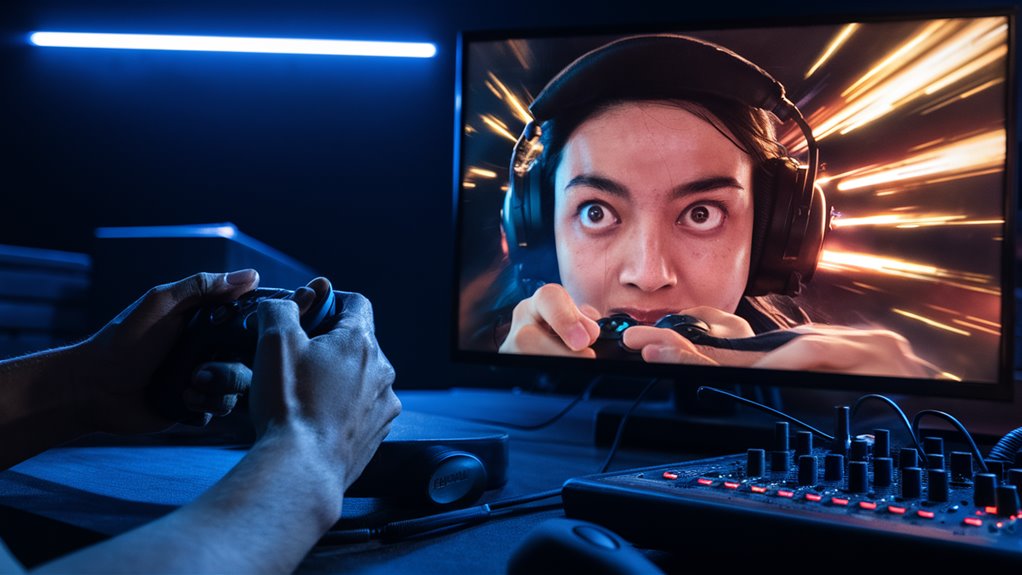
Let’s talk about how sound shapes your gaming experience, especially during those intense combat moments. You know how music can affect your mood? Well, in video games, it goes way beyond that, particularly when you’re in the thick of battle.
Think about those times when you hear the faint footsteps of an enemy approaching, or that distinct swoosh of an incoming attack. Your brain kicks into high gear, right?
That’s because these audio cues tap into your natural survival instincts, helping you react faster than you’d with just visual information.
The music tempo is pretty fascinating too. Have you ever noticed how your heart starts racing when the combat music picks up?
It’s no accident. Fast-paced tracks get your adrenaline pumping, and you’ll often find yourself naturally falling into rhythm with the beat as you dodge, block, and attack.
It’s almost like dancing, but with swords and fireballs.
Sound positioning is a real game-changer in combat. Picture this: you’re sneaking through a dark corridor, and suddenly you hear movement to your left.
Even before you see anything, your brain has already mapped out where that threat is coming from. That’s the magic of good audio engineering at work.
And let’s not forget about those satisfying weapon sounds. There’s just something about hearing a meaty thud when your sword connects or that crisp bang of a well-placed shot.
When the sound effects pack a punch, you feel more powerful, and that confidence shows in how you play.
It’s like the difference between hitting a tennis ball with a solid thwack versus a weak tap.
Emotional Engagement Through Musical Cues
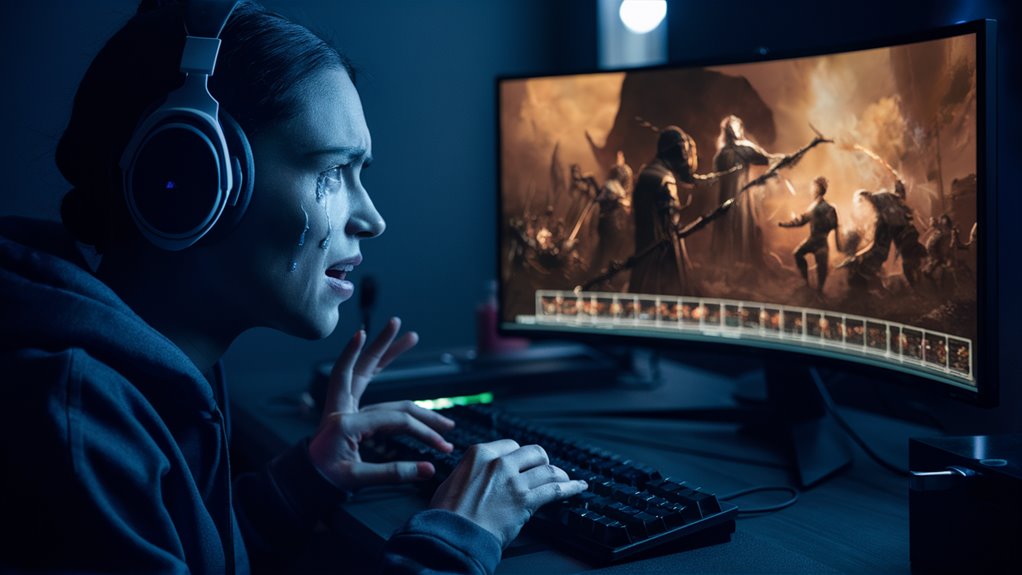
You know how music can instantly change your mood? Well, game developers have really mastered this emotional superpower.
Let’s talk about how they use music to transform regular gaming moments into experiences that stick with you long after you’ve put down the controller.
Picture this: You’re walking through a seemingly peaceful dungeon when suddenly the music shifts to an eerie minor key.
Your heart starts racing before you even see the boss. That’s no accident. Game composers know exactly how to play with our emotions, using everything from subtle musical cues to full-blown orchestral pieces that make victory feel absolutely epic.
The really clever part? The music actually adapts to what you’re doing.
When you’re just exploring a vast open world, you might hear gentle, ambient tunes. But step too close to an enemy camp, and the tempo picks up, drums start beating faster, and your brain automatically goes into high alert mode.
It’s like having your own personal movie soundtrack that knows what’s about to happen before you do.
What makes video game music so special is how it connects you to your character’s journey.
Think about those quiet moments when a simple melody tells you more about a character’s feelings than any dialogue could.
Or those big story reveals where the music swells at just the right moment, giving you goosebumps.
When done right, these musical elements work together with the game’s visuals and story to pull you deeper into the experience.
Pretty amazing how a few well-placed notes can make such a difference, right?
Common Questions
Can Players With Hearing Impairments Still Experience Gaming Music’s Psychological Benefits?
You know, if you’re a gamer with hearing impairments, there are still plenty of amazing ways to tap into the emotional power of gaming music. Let’s break it down – your body can actually feel the rhythm and energy of game soundtracks through vibrations and tactile feedback. It’s pretty incredible how modern games have adapted to make this possible.
Think about it like this: when you’re playing a game with deep bass sounds, you can often feel those vibrations right through your controller or gaming chair. Many developers have caught on to this and now include special accessibility features that transform music and sound effects into physical sensations you can experience through touch.
But that’s not all. Modern games are getting really creative with visual cues that sync up with the music’s rhythm. Picture health bars that pulse to the beat, or background elements that move in time with the soundtrack. Some games even use your device’s haptic feedback to create intricate patterns of vibrations that match the musical score.
Do Different Gaming Genres Require Specific Musical Approaches for Maximum Effectiveness?
Let’s talk about how different types of games need their own unique musical flavors to really hit the mark. You know how horror games just wouldn’t feel right without those creepy, spine-tingling soundtracks that keep you on edge? Well, it’s fascinating how each gaming genre has its own musical personality.
Take RPGs, for instance. When you’re embarking on an epic quest across vast landscapes, those sweeping orchestral scores really make you feel like a hero on a grand adventure. And if you’ve ever played fast-paced action games, you’ll know that nothing gets your heart pumping quite like those high-octane, energetic tracks that match your every move.
It’s kind of like how different movies need different soundtracks. Just imagine a horror scene with happy pop music, or a romantic moment with heavy metal. It just wouldn’t work, right? The same goes for games. Each genre has its own musical sweet spot that helps create the perfect gaming experience.
How Much Do Game Developers Typically Invest in Soundtrack Development?
Let’s talk about game soundtrack budgets, because they’re actually pretty fascinating. You know how some games just nail that perfect musical atmosphere? Well, it turns out creating those soundtracks can cost anywhere from $50,000 for smaller indie games to several million dollars for AAA blockbusters.
The budget really comes down to a few key factors. First, there’s the question of whether developers are going with licensed music or creating original compositions. Think about games like Grand Theft Auto, which shells out big bucks for popular songs, versus something like Journey, which invested in a beautiful, custom-made score.
For most mid-sized games, developers typically set aside about $200,000 to $500,000 for music. This might sound like a lot, but when you consider that composers often spend months crafting unique themes, working with live orchestras, and recording multiple variations of each track, it starts to make sense.
Some indie developers get creative with smaller budgets, maybe working with up-and-coming composers or using synthesized instruments instead of full orchestras. On the flip end, major studios might spend upwards of $1 million for that perfect soundtrack, especially when they’re trying to create something truly memorable that’ll stick with players long after they’ve finished the game.
Can Gaming Soundtracks Help People Focus During Non-Gaming Activities?
You know what’s really interesting about video game music? It turns out to be an amazing companion for getting things done, even when you’re not gaming at all. Think about it – those carefully crafted soundtracks that keep you engaged during intense gaming sessions can actually help you power through your workday or study sessions. Game composers deliberately create music that helps maintain focus without pulling your attention away from the task at hand. Unlike regular pop songs, there aren’t any catchy lyrics to make you start singing along when you should be concentrating on that important presentation or challenging homework assignment. So next time you need to buckle down and focus, try pulling up some of your favorite game soundtracks. Whether it’s the epic orchestral scores from games like Final Fantasy or the ambient electronic beats from Minecraft, you might be surprised at how much they help you stay in the zone.
Do Cultural Differences Affect How Players Respond to Certain Gaming Soundtracks?
You know, it’s fascinating how our cultural backgrounds shape the way we experience video game music. Think about it – when you hear those familiar musical patterns or instruments from your own culture in a game, something just clicks. Maybe you’re from East Asia and instantly connect with the ethereal sounds of traditional Chinese instruments in games like “Genshin Impact,” or perhaps you’re European and find yourself drawn to orchestral scores that remind you of classical music you grew up with.
Let’s be real, we all have those musical comfort zones that feel like home. Sometimes you might not even realize why certain game soundtracks resonate with you more than others. It could be the way melodies flow, how emotions are expressed, or even specific rhythms that just feel natural because they’re part of your cultural DNA.
Take Japanese RPG music, for instance. Players who grew up with J-pop and traditional Japanese music often get those subtle musical references that might fly right over someone else’s head. Or consider how African gamers might naturally groove with complex polyrhythms in game scores that could feel unfamiliar to Western players.
Pretty interesting stuff, right? And while we’re all different, gaming music has this amazing way of becoming a universal language, even as we experience it through our own cultural filters.